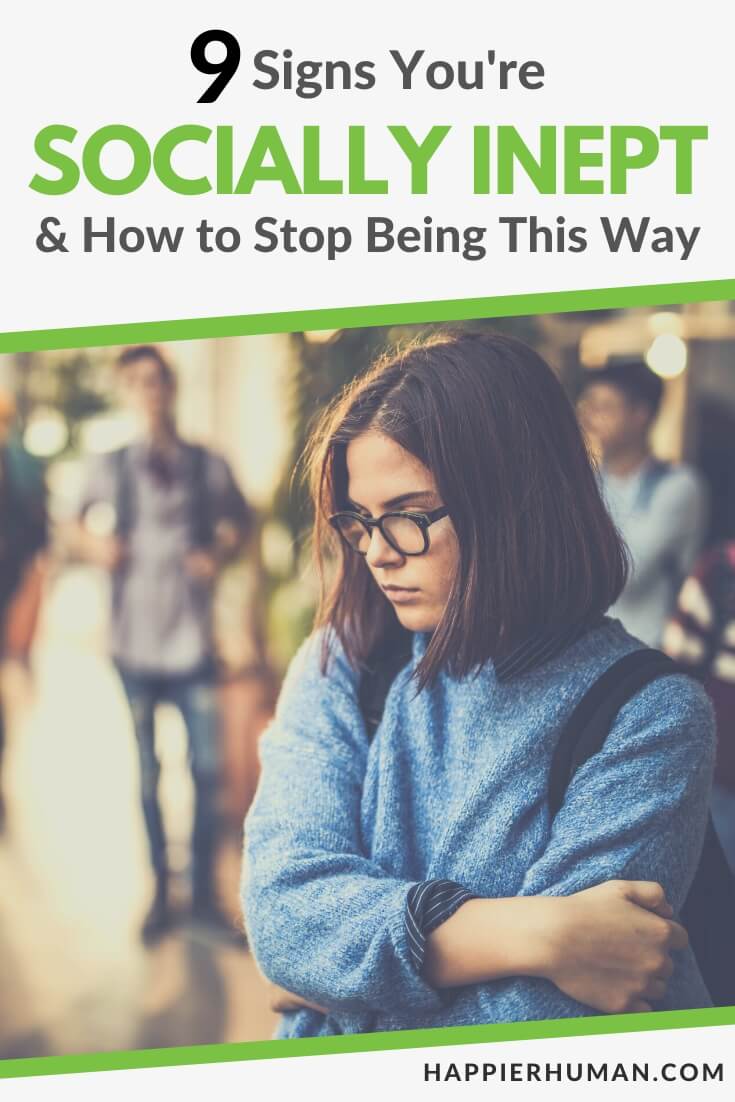When the waiter brings your meal and says “Enjoy,” do you reply with a “You too?” (Even though they aren’t sitting down at your table to share your food.)
Or what about when your coworker says they are stepping out to visit the restroom? Do you say something like “Can I come with you?” (Because what are you supposed to say, and saying nothing is just strange, right?)
Or do you avoid socializing at all costs because you feel super nervous and know you tend to misread people and respond inappropriately or incorrectly?
I know I do!
The bad news is that these are signs that you are probably socially inept. The good news is that there are steps you can take to stop being this way.
Here’s everything you’ve ever wanted to know about feeling socially awkward or uncomfortable and how to stop it now.
What Does Socially Inept Mean?
Being inept means that you have little skill or you are clumsy. So, it makes sense to say that when you are socially inept, you lack social skills or act clumsily in social settings, such as not knowing how to respond appropriately, misreading social cues, avoiding small talk, and feeling nervous or anxious to a stomach-churning-worthy extent.
A person who is socially awkward may be that way because they are:
Someone who is skilled in the art of conversation and being social seems to know intuitively how to act, what to say, and how to respond.
Someone who is socially awkward doesn’t have that instinctive nature when it comes to social environments and how to make things happen organically. If you identify with being socially uncomfortable, you probably feel like a fish out of water and like you just don’t belong in social settings.
Interestingly, introverts are often or may come across as socially awkward because they prefer to keep to themselves and they may be shy. If you are an introvert, you don’t see the point in making small talk, you prefer to observe and listen, and you need your me-time to recharge those social batteries of yours.
That doesn’t necessarily mean that as an introvert, that you are socially uncomfortable. With the right people – your inner circle whom you feel comfortable – you may be more extroverted or ambiverted even (and thus, more socially intune).
But you may feel like you don’t belong in large groups because it’s just too much and overwhelming. And too much socializing does lead to burnout.
Reasons Why a Person May Be Socially Awkward
You may not be socially uncomfortable in every single social situation; there may be some settings that bring out that social awkwardness more than others or you may be thrown in the deep end of a totally new situation and feel out of your depth socially.
For example, you may feel awkward when you are around certain colleagues or those in upper management, or you may be extra nervous when you attend college or a networking event for the first time.
For some people, social ineptitude is more the norm than just an occasional strange visitor or phase, and there are various reasons why a person may be socially awkward.
Here are the top reasons why you may be socially inept:
The Potential Impact of Being Socially Awkward?
We live in a social world where having good social skills helps you connect with others, helps you feel like you belong, and gives you opportunities you otherwise wouldn’t have. Society frowns on those of us who are socially awkward, and sadly, we are harshly judged for it.

If you don’t find it easy to socialize (like it’s second nature), then there must be something wrong with you (#SoPeopleThink). If only the world was a little more tolerant of those of us who don’t fit the mold.
There are quite a number of negative impacts if you have poor social skills, and here are the main ones:
And before you feel all down in the dumps because having poor social skills is ruining your life, I want to mention that being socially uncomfortable may not interfere with your day-to-day life. There are instances where being socially awkward is a good thing:
9 Signs You’re Socially Inept
Not sure whether you are socially awkward? Here are 9 signs that you could be socially inept:
Sign 1. You Avoid Social Interactions
One of the main signs of being socially awkward is that you avoid social interactions because you:
I get it. I used to walk the opposite direction in grocery stores and wherever else I was just to avoid interacting with people and get away from them (and still do – sometimes).
Do you wish for the elevator doors to close faster so your coworker can’t get in for the ride up or down? Do you take the stairs when you spot your neighbor in the elevator? Do you say no to social events so you don’t have to do the whole meet and greet thing?
Then you are avoiding people because even just the thought that you have to engage is nerve-wracking. And as a result, you appear to be rude, standoffish, awkward, and unapproachable, making others avoid you.
Sign 2. Conversations with Others Are Often Cut Short
When you do try to connect and engage with people, you may find that conversations are cut short. The people you are talking to (or trying to talk to) will quickly move on or find some excuse to exit the convo.
They may say something like, “Oh, I just spotted my boss. I better go say hi before I’m fired,” “I’m thirsty. I need a drink – like right now!” and “Oh, that’s interesting. Uhm, would you please excuse me for a moment?” (And then they never return).
Any of this sound familiar?
I bet it does.
People cut off the conversation and move away from you because they feel uncomfortable. You struggle to carry on with the small talk, you’ve said or acted inappropriately, or you just stand there quiet like a mouse.
Sign 3. You Are Often Excluded
If you are socially awkward, you may find that you are often excluded. People don’t just avoid talking to you, but they also avoid working with you.
You may be stuck with solo projects, not paired up because everyone else finds a partner so easily, or “included” as a kind of third wheel because you are “left out” but need to work on a group (or a pair that became three).
People don’t want to work with you or otherwise talk to you because of your closed-off body language, your attitude, or poor conversation skills. So, you are “left out in the cold” – not invited out for drinks and not asked to work on a project together.
And even if you are more comfortable working on a project by yourself, seeing others connect and get along reinforces that you don’t belong and that you are socially awkward.
Sign 4. You Overanalyze Social Interactions
You may be socially uncomfortable when you replay your social interactions over and over in your head. You analyze what happened, what was said, how you acted, and how things went horribly wrong. You zero in on your every (possible) mistake while you blame yourself for being so weird and socially unfit.
You wonder what you did to offend someone or what you said that was stupid or inappropriate.
All in all, you feel frustrated and confused about your poor socializing skills. You may sense that people don’t like being around and you may be aware that it’s because of you. And you could know that it’s because you aren’t socially savvy, but you may not know entirely what you did or didn’t do that was wrong.

You dwell so much on past interactions that it becomes more and more difficult for you to engage with others. And while you may dream of magically transforming into a socially savvy butterfly, the harsh reality just comes more real as you overanalyze and realize that you are coming up short.
Sign 5. You Rarely Have a Second Date
You are lucky if you get to go on a first date, but then you muck it up because you are socially unsavvy and a second date is just an unrealized dream.
On your date, you may:
Needless to say, your date found you off-putting.
It’s the same if you happen to go out with a hope-to-be friend, and the second outing or future interactions don’t happen or are just way too awkward – for you both (even if you don’t realize it).
Sign 6. People Tell You That You Are Weird or Awkward
While someone may be hesitant to tell you straight up that you are just too weird or socially awkward, others will get off on telling you how you don’t fit in, how you are a weirdo, and how much you lack socially (#AdultBullies).
People can be cruel, and it’s not easy to hear comments such as these. It’s plain hurtful to be criticized.
Not everyone who tells you that you are weird will be correct, but it is good to self-reflect and see if there is a grain of truth to what they are saying. Are you socially awkward, or are they just jealous and trying to tear you down?
Sign 7. You Act Clumsy in Social Settings
You are most likely socially uncomfortable if you are clumsy in social engagements. The clumsiness is probably because you are nervous (or feel triggered because of other negative social situations).
In a social environment, you may bump into walls, trip over your shoelaces, drop stuff, spill your drink, or choke on what you swallowed. You may also start to stutter and stammer, laugh awkwardly, completely shut down, or find that you can’t stop talking.
These embarrassing mistakes further undermine your social confidence and make you want to avoid getting your social on.
And when you are clumsy, you feel embarrassed and as if every person is laughing at you and judging you (and finding you wanting). You try to leave the gathering as soon as possible, and if you can’t leave (yet), you withdraw and go super quiet.
Sign 8. You Don’t Understand Timing in a Conversation
Another clear sign that you are socially awkward is when you don’t understand how important timing is in a conversation. That is, the time to:
Beyond these, you don’t know how much eye contact is enough, hold your body naturally so you display “open and welcoming” body language, understand another person’s body language and social cues, and how not to say something inappropriate (or think before you speak).
Conversations need to flow and be organic, but around you, that seems like a myth. You seem to naturally disrupt the flow of a conversation and make those around you uncomfortable or very aware of the fact that you don’t belong in the discussion.
Sign 9. Fill Awkward Silences or Pauses with Inappropriate Jokes or Comments
Silences are also part of conversation, and it’s natural to not feel at ease with some silences. (#AwkwardSilences)
But when you aren’t socially savvy, you tend to fill these pauses or silences with inappropriateness, whether it be jokes, laughter, comments, or non-sensicals.
Whatever you do falls flat, raises eyebrows, or gets you criticized.
Conversations can also stop flowing because you don’t know what to say or how to fill the gap with small talk.
Step-by-Step Guide to Stop Being Socially Inept
While there may be benefits to being socially awkward, it can keep you from being authentically you, from connecting and belonging, and from getting opportunities in life.
If being socially uncomfortable is making life unbearable, it’s essential to work on your social skills so you can thrive and put the fear of judgment, humiliation, and more behind you.
Here’s my step-by-step guide to overcome being socially awkward:
Step 1: Identify Whether You Are Socially Awkward
The first step you need to take to work on your social skills is to become aware that you are socially awkward, and you can only identify that when you know the signs of a socially unsavvy person.
You can refer to the signs I discussed in detail, and if most of these resonate with you, then you probably have poor social skills.
Step 2: Change Your Mindset
“To change your behavior for good, you need to start believing new things about yourself.” ~ James Clear
While it’s good to know you are socially awkward, you need to change how you see yourself in social situations. When you see yourself as socially uncomfortable, you may apologize for your behavior because you feel ashamed or embarrassed.
Become aware of what words you use to describe yourself. You want to eliminate anything that sounds like “I’m such a weirdo,” “I’m shy,” “I’m socially awkward,” and “I don’t know how to talk to others.”
Change how you speak to yourself and what you think of yourself. You have made a commitment to work on your social skills, so rather say “I am working on it,” or “I am becoming more confident.”
Words have power, and what you say about yourself matters. So use positive self-talk and affirmations to help you reframe your thoughts and motivate you to become more socially savvy.
Step 3: Learn to Be an Active Listener
Most people think of how to respond rather than focusing on what the person is actually saying. Chances are this is you too (the how to respond person), and not actively listening is not helping you be less socially awkward.
It’s probably increasing your awkwardness because you are too focused on your nervousness, what to say, and whatnot that you aren’t paying attention.
Did you know that listening is a social superpower, and when you start to listen mindfully and actively, you:
When someone feels heard, it makes it more likely that you’ll connect and act socially savvy.
Step 4: Learn to Ask Open-Ended Questions
Because conversations lull when you are socially uncomfortable and because you often don’t know what to say, practice asking open-ended questions to keep the conversation going and prevent awkward pauses.

Open-ended questions can also help you smoothly transition from small talk to more meaningful and deeper conversations.
Asking questions takes the focus off you as the other person is invited to keep talking and sharing. This also helps ensure you don’t act inappropriately as you can just focus on asking questions and what the other person is saying. (#Win-Win)
Step 5: Learn Empathy
One reason why you struggle to relate to and connect with people is because you aren’t empathic. You don’t understand or can’t identify with their thoughts, emotions, and needs.
But you can change your social awkwardness around and practice empathy by:
Step 6: Thinking Before You Speak
To think before you speak requires that you become more mindful, keeping your social filter on, and enforcing healthy boundaries (especially for yourself so you don’t overstep and act inappropriately).
When you are socially awkward and have no filter, you:
These should be on your no-no list. Don’t just say whatever comes to mind.
Before you speak, take a few seconds to think your response through and go through that “no filter” checklist (is it appropriate? Is it a private matter or taboo? Etc.) before you share.
Step 7: Practice Your New Social Skills
The new social skills you’ve learned need to be put into practice. But you want to keep expectations low and not set yourself up for failure, and that’s why it’s essential to start low and slow.
Identify low-pressure social situations. You can talk to the bus driver, the bartender, the cashier, taxi driver, or waiter.
Find something kind to say, listen with intent, ask open-ended questions, keep your body language open, and learn from their social adeptness.
Final Thoughts on Being Socially Inept and Overcoming It
Being socially awkward has some benefits… but to be honest, we live in a social world, where having good social skills are rewarded. Social ineptitude prevents you from fully experiencing life and getting ahead.
You may be socially inept if you avoid social interactions, stumble and do inappropriate things during conversations, don’t understand body language and social cues, act clumsily, overanalyze social situations, and are often excluded.
Take matters into your own hands and work on your social skills so you can feel more comfortable around people, make small talk, get that promotion, and feel like you belong. Because you do belong – warts and all.
Want to work on being “more normal”? Then check out our guide on 11 ways to be normal and not act weird. Remember: Learn to love yourself as you are while you master the art of social interaction.


